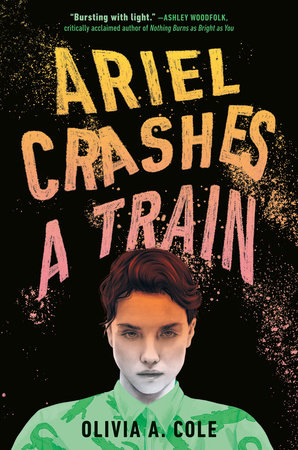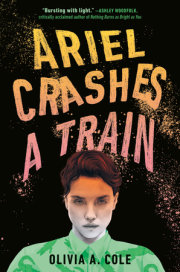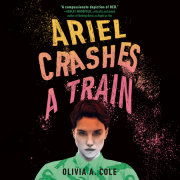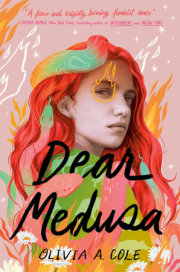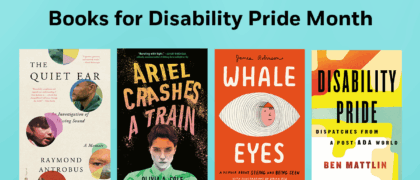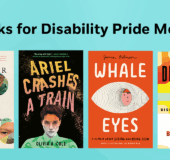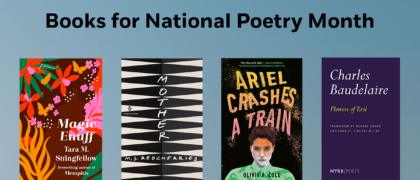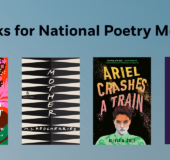I have to.
Every time I leave the kitchen
whether I’m going
in or out of the house.
It’s a rule written in blood.
This morning, like every morning,
I stare down at the collection of kitchen knives
in the drawer by the stove.
There are ten of them, one for each finger,
short and long, serrated and not,
silver silver silver
I know them all well.
This is the rule:
in order to stop myself from driving one of them into my father’s chest I must open the drawers—the silent kind
that don’t slam—and tap each blade
with one finger, six times
for each knife:
tap
tap
tap
tap
tap
tap
I have to concentrate.
Each tap measured, firm.
On the third knife, the fifth tap is too soft.
I start over.
Two more times
until I get it right
and all the scales growing inside me
soften back into flesh
and smooth wet organs.
Only then can I go
to the front door.
Everyone is safe.
For now.
I’m going to try one more time.
The bus stop is where I used to think my best thoughts—
maybe because there, the world
is as noisy as the inside of my head:
clangor and clamor and squeaking brakes
people nodding to music
and each other,
coming and going.
I can wear headphones with no music
and no one knows any different—
if my head twitches or my neck bends
they all think
MUSIC. That girl is into her music. On the bus, I can make myself small
all 5′11″ of me balled
against the smudged window.
I am part of the scenery—we all are.
I haven’t tried in one week
because it already happened once
and I wanted to give it time,
maybe let it fade.
Today it’s not rush hour.
Today the rush is less rushing—
an old woman and her shopping bag
two young guys with backpacks
and me.
A bus is coming but it’s not ours
and the old woman has old woman eyes
so she can’t see that it’s the 44
not the 14
so she’s stepping forward to the curb
expectantly
and the bus isn’t slowing down
and then it happens.
I’m pushing her.
My muscles seize—
something green and scaly
nestled between ropes of my intestine
coming awake and thrashing its tail.
screech of the bus sickening thud of steel against eighty-year-old bones shopping bag catches the wind sweeps out into the street a single apple rolls toward the sewer and at first I’m running away
then, when my lungs shout,
walking. Four blocks away
I finally look back.
The 14 is pulling up and one of the guys
with backpacks holds the woman’s shopping bag
while she climbs slowly on board.
The insistent beeping of the bus’s
kneel ricochets down the block.
When the bus catches up to me,
the wind from it blowing by
throws my hair in a cyclone.
Three miles to go.
Other buses will come
but they’re not an option anymore.
In the pit of my stomach
the crocodile is awake
and by now I know
that the only way to keep
everyone safe
is by making sure the beast
has lots of space.
Meeting Leah should feel like comfort—
a friendship sprouted
on a school bus in fourth grade, both of us
small (even me, then) with big voices, yelling
at a boy who emptied his pencil sharpener
down the back of a girl’s shirt.
Neither of us was afraid to use
the word
fuck and when neither of us
got in trouble, it felt
like we were charmed,
that we had charmed each other.
Leah’s voice has grown and grown:
president of the Jewish Student Union,
co-chair of the Young Chemists Society.
I asked her on Halloween if she’d outgrown me.
You can’t outgrow what you’re made for,she’d said, but it didn’t feel like an answer,
and lately it feels like even if she’s not
outgrowing me,
then maybe the tree of her
is merely growing in another direction,
like the peace lily in my mom’s office
always arching toward the window.
Leah has a boyfriend—Cesar—
with a smile like that: like the sun.
I don’t blame her for leaning into him
when lately everything about me
is mist.
It’s June but Leah wants hot chocolate
and these are the things I love about her,
but when I sink down across from her
I almost forget to smile.
Across the street, a cat stares at itself in a store window,
lashing its tail, suspicious of its own reflection.
I feel the same way
and this is why:
Copyright © 2024 by Olivia A. Cole. All rights reserved. No part of this excerpt may be reproduced or reprinted without permission in writing from the publisher.

